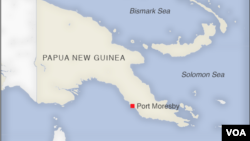Senior Australian ministers are in Papua New Guinea to discuss security and development amid China’s growing ambitions in the region.
The ministerial forum comes at a critical time with the Canberra government hoping to maintain its position as a dominant trade and security partner in the Pacific.
Papua New Guinea is boosting trade ties with China and has had negotiations with Beijing over policing cooperation, which has caused alarm in Canberra and Washington, which struck a defense accord with Papua New Guinea last year.
Australia's high-level delegation to Papua New Guinea includes Foreign Affairs Minister Penny Wong, Defense Minister Richard Marles, and ministers for cyber security, agriculture and fisheries, trade and international development.
They will join their counterparts for talks Wednesday on economic and security cooperation.
Wong told the Australian Broadcasting Corp. that Canberra will pursue its own interests, while Beijing will do the same.
“We do not expect China to stop being China. China will continue to assert its interests," she said. "How we deal with that is to assert ours and we do so both in the bilateral relationship but also in the way we engage in the region and the way we engage with other powers.”
Meg Keen, director of the Pacific Islands Program at the Lowy Institute, a Sydney-based research organization, told VOA that both Canberra and Washington want to limit Beijing’s influence in Papua New Guinea.
China has already sent police to neighboring Solomon Islands and Kiribati, insisting it has a plan to help Pacific Island countries maintain social order.
Australia has, however, said that Beijing should have “no role” in policing the Pacific Islands, and that the Canberra government will train more local security forces to fill gaps.
Keen said China has strategic ambitions in the Pacific region.
“China is in a competition with Taiwan for recognition and since 2019 it has been able to win the support away from Taiwan of three countries in the region. That is significant. Kiribati is one of those," Keen said. "So, while these are small countries they have enormous ocean territories. They sit in a very strategic place between the United States, Australia and Asia.”
This week, the Chinese Premier Li Qiang held talks with senior government officials in Australia.
It was a further sign that bilateral relations, which have been strained over various geopolitical and trade disputes, are improving.
However, differences between the two sides remain over human rights, the South China Sea, allegations of cyber espionage and, increasingly, over Beijing’s ambitions in the Pacific, a region Australia has traditionally considered to be its sphere of influence.




